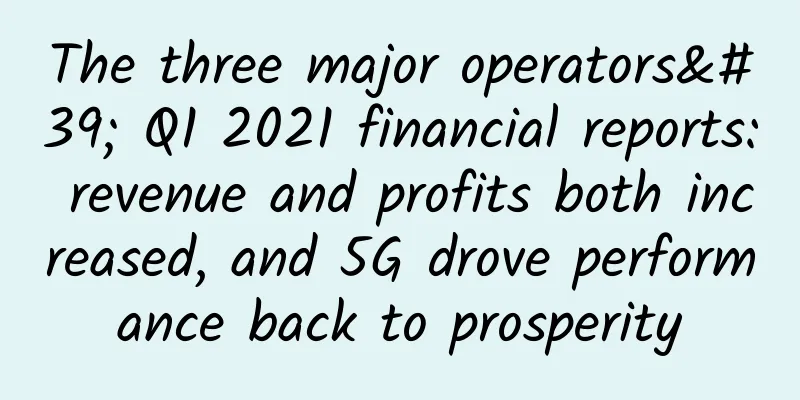Will the cloud business of the three major operators surpass Alibaba and Tencent in 2021?

|
In the past, during the evolution from 2G/3G/4G, although the three major operators were gradually becoming pipelines, they were at least still able to survive.
With the in-depth development of mobile Internet, the disappearance of the demographic dividend, and changes in the overall environment such as speed increase and fee reduction, the traditional businesses of the three major operators are increasingly facing various severe challenges. Especially with the maturity of 4G networks, more and more Internet companies and content providers are participating in the value chain of the Internet industry. It is becoming increasingly clear that the three major operators are only playing the role of providing traffic pipelines for applications and content. Today, the phenomenon of operators being piped has become more and more serious. The three major operators are almost becoming "plumbers" working for Internet companies and content providers. Therefore, in order to avoid becoming a mere data pipeline and for their own future development, transformation has become the only way forward for the three major operators. As we enter the 5G era, with the development of big data, cloud computing and the Internet of Things, cloud services and cloud-network integration have become the breakthrough points and key paths for transformation and upgrading for the three major operators. In the past 2020, cloud-network integration, cloud-network integration, and cloud-network collaboration have become super hot words among operators, and have also become the "grand strategy" that senior executives of operators particularly value. Although the three major operators have launched their own cloud computing products, China Mobile has its own cloud computing product, China Telecom has its own Tianyi Cloud, and China Unicom has its own Wo Cloud. However, in terms of specific implementation methods and strategies, these three old rivals still have different approaches. Among them, China Mobile's 5G+ cloud, with the N+31+X layout, launched the cloud-network integration strategy of "one cloud, one network, integrated service", promoting the deep integration of cloud+network IT systems. China Telecom's Tianyi Cloud has released three enabling platforms: the intelligent edge cloud platform, the AI open platform, and the enterprise application development platform (EADP), creating a cloud-network integration system through "+edge", "+AI", and "+platform". China Unicom is accelerating the expansion of its scale in the cloud market by promoting its cloud-network integration transformation through joint and self-built cloud pools and layered construction. In addition to the three major operators, there are also big players participating in the cloud service arena, such as Internet companies, hardware providers, and IT system integrators. So, in 2021, how much market share can the three major operators occupy in the cloud computing market? And what strategies should they use to compete with those big players? In fact, compared with Internet companies, hardware providers, and IT system integrators, operators’ advantageous resources are very obvious. Especially in terms of network export bandwidth and data center resources, it can be said that Internet companies, hardware providers, and IT system integrators simply do not have them. But unfortunately, in the entire cloud service ecosystem, the most active are Internet companies and IT system integrators. For example, cloud service providers such as Alibaba Cloud, Tencent Cloud and Huawei Cloud currently occupy the majority of the domestic cloud business market. However, the three major operators have only achieved good results in government cloud. In my opinion, if the three major operators want to expand their market share again and get a piece of the trillion-dollar cloud market, it is not enough to have products, they must also give full play to their own unique competitive advantages. Although the cloud service methods of the three major operators are constrained by the inflexibility of the system and mechanism, if they can give full play to their unique competitive advantages, they will have great opportunities to gain more market share outside of the government cloud. For example, the three major operators have nationwide network, IDC resources, channels, and service advantages. In the second- and third-tier sinking markets, cloud service providers such as Alibaba Cloud, Tencent Cloud, and Huawei Cloud are still difficult to reach. So, if we can be the first to provide cloud services to small and medium-sized enterprises in the sinking market, isn’t this an opportunity? You know, more than 90% of domestic enterprises are small and medium-sized enterprises. In addition, compared with first-tier developed regions, small and medium-sized enterprises in second- and third-tier sinking markets still prefer a service experience that can be "called in and dismissed at will". If other cloud service providers want to deploy long-term resident service personnel across the country, they still need to consider costs and time such as human resource costs and channel construction. But this is not a problem for operators. After all, there are so many branches in cities, counties and districts. Although small and medium-sized enterprises in the sinking market have the disadvantage of low average order value, if they have a large market share, they can also generate considerable income. At present, facing the digital transformation needs of the "five verticals and three horizontals" of social and economic life, operators should seize the opportunity and transform their advantages into real service capabilities in the critical period of transition from business model exploration to rapid outbreak, so as to quickly open up the situation on the road of transformation and upgrading. At present, the products and systems of the three major operators have begun to take shape. If they can find the right direction for promotion and expansion in the future, it should not be difficult for the cloud business to achieve greater results in 2021. So, do you think the cloud business of the three major operators can outperform Alibaba Cloud, Tencent Cloud and Huawei Cloud? Welcome to leave a message to discuss. |
Recommend
Three trends driving cyberattacks in 2024
Ransomware claim activity is set to grow more tha...
Application performance improved by 70%, exploring the implementation principle and implementation path of mPaaS full-link stress testing
Business Background As the mobile development ind...
Can the Internet of Things drive the deployment of IPv6?
IPv6 has features that IPv4 lacks, which makes it...
Have you already moved to SDN network?
Today's networks are constantly changing and ...
Summary information: Yuanyun/OVZH/Shumai Technology/Fanyun
October and November coincide with the Double Nat...
The three major operators announced their operating data for May
Recently, the three major operators released thei...
Unleashing the power of 5G: Innovative devices will revolutionize connectivity
There’s no denying that the advent of 5G technolo...
Yunhai: A complete cloud server management system developed based on JAVA+NET
As we know, Standard Interconnect is a business t...
China has opened nearly one million 5G base stations, and China Mobile is almost caught up
According to the latest data, the three major ope...
How to build your private LTE network
Private LTE networks are becoming increasingly po...
Short Video Technology Guide: Evaluation of the Top 5 Short Video Solution Providers in China
Statistics from 2016 show that the average daily ...
Cloud computing: the first city of new infrastructure to emerge during the epidemic
There is no doubt that 2020 is a huge boom period...
The "love story" between single boards and switches: How to identify the support relationship between them?
Have you ever had a question: Which switch suppor...
Flash is going to be discontinued, but new technologies in the 5G era will leave you no time to recall the past
I saw a piece of information that Adobe said it w...
What are the technical difficulties in implementing a multi-person collaborative online document?
This is a long-awaited answer. It just so happens...


![[11.11] LOCVPS top up 100 yuan and get 10 yuan, all hosts are 60% off, Hong Kong VPS monthly payment starts from 22 yuan](/upload/images/67cabd32b921f.webp)






